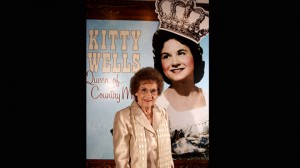Country music star Kitty Wells dead at 92
Kitty Wells (the “Queen of Country Music” who opened the door to a host of female country music headliners) died on Monday at her home in Nashville of complications from a stroke. She was 92.
Among those mourning her passing was Loretta Lynn, whose own rise to popularity came after Wells, who paved the way for strong female voices in country music. “Kitty Wells will always be the greatest female country singer of all times” – said Lynn in a statement released on her web site.
“She was my hero. If I had never heard of Kitty Wells, I don’t think I would have been a singer myself. I wanted to sound just like her, but as far as I am concerned, no one will ever be as great as Kitty Wells.
“She truly is the Queen of Country Music.”
When Kitty Wells died Monday at the age of 92, country music lost one of its few remaining stars from the midcentury golden age of honky-tonk. But the rest of us lost something even more significant. An architect of modern pop, one of the first female singing stars to make music explicitly about the experiences of women. Without her, there certainly would never have been a Patsy Cline, a Loretta Lynn, a Dolly Parton, or a Miranda Lambert—but there equally would never have been a Janis Joplin, a Patti Smith, a Joan Jett, or a Britney Spears.
Her first hit and signature song (“It Wasn’t God Who Made Honky Tonk Angels”) was written as a direct rebuke to a line in Hank Thompson’s “Wild Side of Life” and precipitated a flurry of scandal upon its release in 1953. NBC’s powerful network of Southern and rural stations and country programs—including the self-important arbiter of country-music legitimacy the Grand Ole Opry—almost instantly banned it. Like the Dixie Chicks would two generations later, Wells had run afoul of the cynically moralizing Music Row which, in common with the rest of the music industry, vastly prefers women to look pretty and sing sentimentally than to speak their minds.
The song’s argument, delivered in Wells’s unadorned, declarative style, was that if fallen women were to be blamed for being the ruin of a man, then the men who had ruined them in the first place should shoulder blame too. That argument wasn’t popular with the good old boys who ran the country-music business—but the country-music audience, largely made up then as now of women with their own minds and tastes, felt otherwise. “Honky Tonk Angels” became one of the few answer songs to outstrip the original in sales. After the song went to No. 1, radio stations bucked the ban in order to satisfy customer demand, and Wells was eventually begrudgingly invited to perform it on the Opry. The 34-year-old Kitty Wells, without really intending to—all she had wanted was a hit, a chance to keep singing for a living—had established a space in American music where women could speak from their own experience without having to filter their stories through a male lens of either sexually charged tragedy or saintly wife-and-motherhood.
Wells was 32 years old and a mother of three in 1952 when she was asked to record “It Wasn’t God Who Made Honky Tonk Angels,” a response to Hank Thompson’s No. 1 hit – “The Wild Side Of Life.”
The song was a defense of women, giving cheating men some of the blame for causing women to stray. “Too many times married men think they’re still single, that has caused many a good girl to go wrong” – Wells sang.
Despite the Grand Ole Opry’s refusal to allow her to sing it on the radio broadcast, the record sold a million copies and dominated the country charts in summer 1952. It even crossed over, reaching the 27th spot on Billboard’s pop chart.
Until then, she had toured as the “girl singer” with her husband’s band, singing gospel songs and old folk ballads. She later said the $125 fee was her motivation for recording the song, which made her country music’s first female superstar.
Wells proved women could sell records and fill arenas by singing country songs from a woman’s point of view, according to her Recording Academy biography. Her recording career included 35 Billboard Top 10 records and 81 charted singles.
“Her songs resonated with women in an evolving post-war America, and she unassumingly paved the way for other strong female country singers, including Patsy Cline, Loretta Lynn, Dolly Parton, and Tammy Wynette, among others” – said Neil Portnow, president of the Recording Academy. “She performed for seven decades, and she continues to be a model for generations of female country singers.”
Wells was the first female country singer to get a Grammy Lifetime Achievement Award, which the Recording Academy presented in 1991.
She was inducted into the Country Music Hall of Fame in 1976.
